#bramwell fletcher
Text

daughter of the dragon |1931|
#gif#anna may wong#bramwell fletcher#daughter of the dragon#1931#pre-code#lloyd corrigan#size up#sizing up#so pretty i could cry#black and white#classic hollywood
144 notes
·
View notes
Text
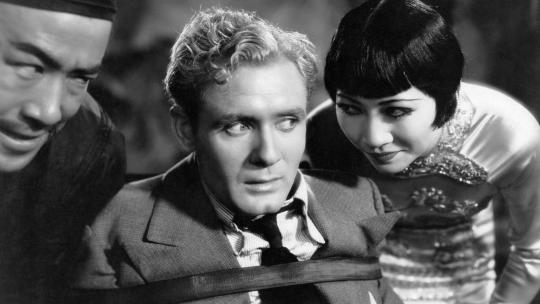
Tetsu Komai-Bramwell Fletcher-Anna May Wong "La hija del dragón" (Daughter od the dragon) 1931, de Lloyd Corrigan.
3 notes
·
View notes
Text

#Random Harvest#Ronald Colman#Greer Garson#Philip Dorn#Susan Peters#Henry Travers#Reginald Owen#Bramwell Fletcher#Mervyn LeRoy#1942
2 notes
·
View notes
Photo

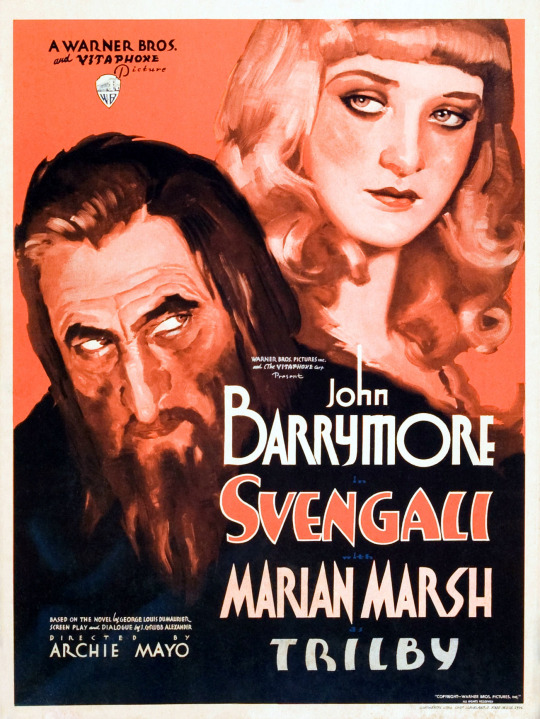
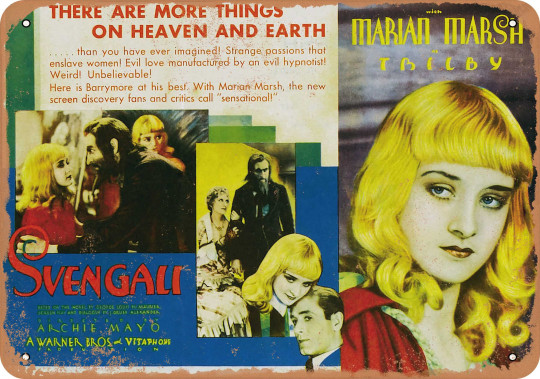
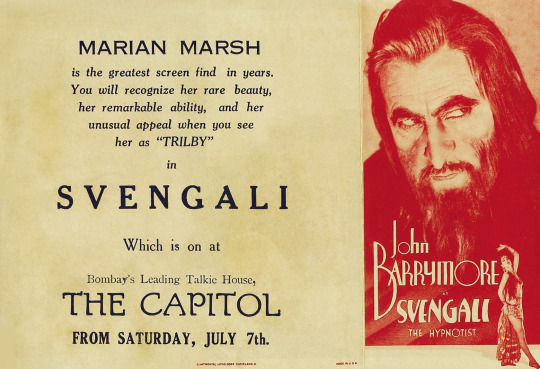
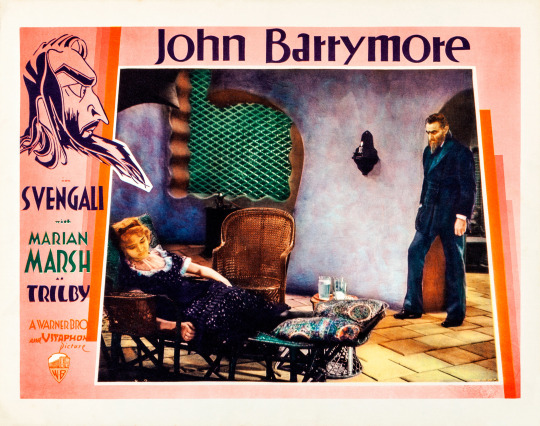
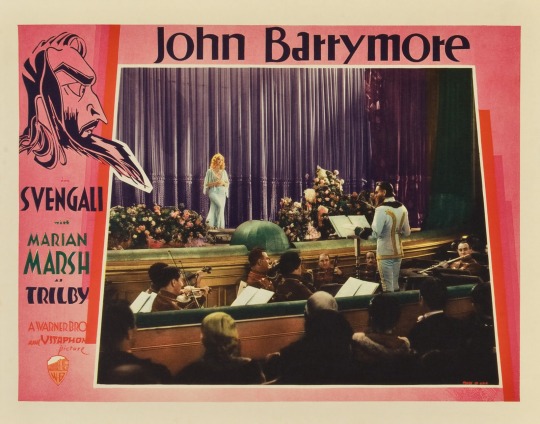
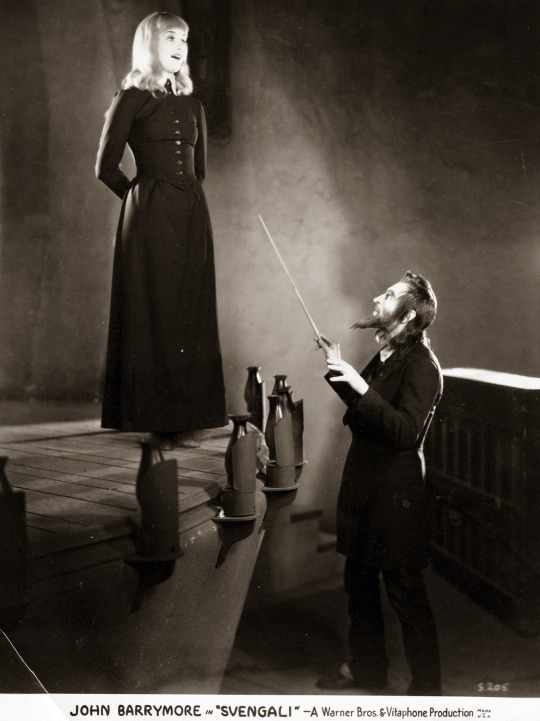
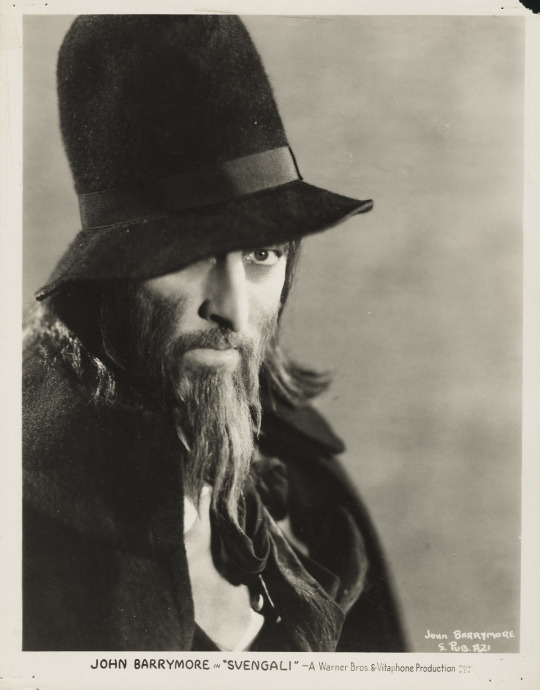

Svengali (1931) Archie Mayo
October 8th 2022
#svengali#1931#archie mayo#john barrymore#marian marsh#bramwell fletcher#luis alberni#donald crisp#lumsden hare#paul porcasi#carmel myers#pre-code
18 notes
·
View notes
Photo
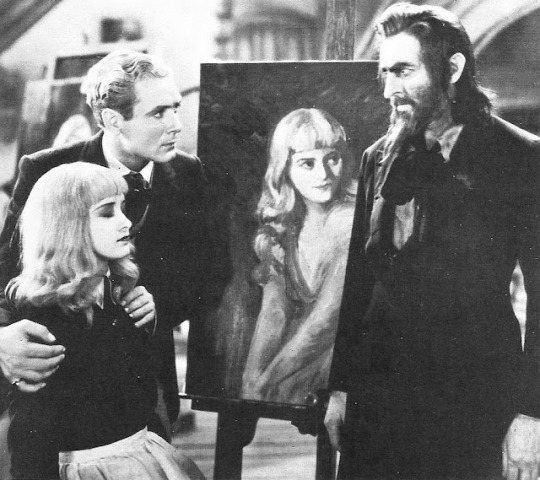
Marian Marsh, Bramwell Fletcher, and John Barrymore in Svengali (Archie Mayo, 1931)
Cast: John Barrymore, Marian Marsh, Donald Crisp, Bramwell Fletcher, Carmel Myers, Luis Alberni, Lumsden Hare, Paul Porcasi. Screenplay: J. Grubb Alexander, based on a novel by George L. Du Maurier. Cinematography: Barney McGill. Art direction: Anton Grot. Film editing: William Holmes. Music: David Mendoza.
George Du Maurier's 1894 novel was called Trilby, as were many of the stage adaptations and early silent film versions. But if you cast John Barrymore as the sinister hypnotist, you almost have to call your film Svengali. It's one of Barrymore's juiciest movie performances, but it surprisingly didn't earn him an Oscar nomination -- an honor he never received. To add to the irony, the best actor Oscar that year went to his brother Lionel for A Free Soul (Clarence Brown, 1931), and one of the actors who did receive a nomination was Fredric March for playing Tony Cavendish, an obvious caricature of John Barrymore, in The Royal Family of Broadway (George Cukor and Cyril Gardner, 1930). Though Barrymore's Svengali doesn't particularly deserve an award, it's the best thing about the film aside from the sets by Anton Grot that were influenced by German expressionism and did earn Grot a nomination, as did cinematographer Barney McGill's filming of them. Like many early talkies, Svengali is slackly paced, as if director Archie Mayo, who learned his craft in the silent era, was still slowing things down so title cards could be placed at the appropriate intervals. It also has some problems of tone: Svengali is not quite the sinister monster you expect him to be from his reputation as an archetype of masterful control. In the beginning he's the butt of horseplay from some of his fellow Paris bohemians, the painters known as The Laird (Donald Crisp) and Taffy (Lumsden Hare), who decide he doesn't bathe often enough and dump him into a bathtub. We know his potential for evil after he causes Madame Honori (Carmel Myers) to commit suicide, but even her character is played for comedy before her untimely end. In this adaptation, by J. Grubb Alexander, the plot revolves around Svengali's manipulation of Trilby (Marian Marsh), an artist's model whose potential as a singer -- even though she can't quite carry a tune -- he deduces from the shape of her mouth. He uses his hypnotic powers to turn her into a diva, though the one performance we see from her, a bit of the Mad Scene from Lucia di Lammermoor, doesn't merit the ovation it receives -- perhaps he hypnotized the audience, too. But control of Trilby comes at a cost: Svengali's health begins to decline, and Trilby's career along with it, until at the end they both die as she performs in a nightclub in Cairo, second-billed to a troupe of belly-dancers. Only the lovestruck young artist known as "Little Billee" (Bramwell Fletcher), who has devoted his life to tracking Trilby in hopes of winning her back, is there to witness her end. Thanks to Barrymore, and some good support from character actors like Luis Alberni, who plays Svengali's assistant with the improbable name Gecko, Svengali is never unwatchable, and it mostly avoids the antisemitic notes that many have observed in the character, who is said to have mysterious origins, perhaps in Poland, in the novel and its adaptations.
7 notes
·
View notes
Text
"RANDOM HARVEST" (1942) Review

"RANDOM HARVEST" (1942) Review
Between 1936 and 1942, author James Hilton enjoyed a prolific period of successful collaborations with the Hollywood studios. Some of those collaborations included writing screenplays for a handful of movies. However, three of those collaborations featured the screen adaptions of a handful of his best-selling novels. One of tho latter proved to be his 1941 novel, "Random Harvest".
Like some of Hilton's previous novels, "Random Harvest" proved to a very popular piece of work that became a major best-selling hit. Metro-Goldwyn-Mayer (MGM) purchased the film rights to novel and set an adaptation of it in motion. Mervyn LeRoy served as the movie's director and both Ronald Colman and Greer Garson were cast in the leads.
Unlike Hilton's novel, screenwriters Arthur Wimperis, George Froeschel and Claudine West abandoned the flashback narrative device for "RANDOM HARVEST". Because the novel had kept the duel identities of "Paula Ridgeway"/Margaret Hanson a secret until the very end, the screenwriters had decided to take a different approach, realizing it would have been difficult to maintain such a secret in this particular film, especially since the characters' faces - especially the leading lady's - must be seen. So . . . instead of treating the November 1918 sequence as a flashback, the screenwriters began the movie at that very moment with a British Army officer named "John Smith" confined to an asylum as an unidentified inmate.
On the day the war ends, the asylum's gatekeepers abandon their posts to join the celebration in the nearby Midlands town of Melbridge, and Smith follows him into town. There, he meets a music hall named Paula Ridgeway (stage name). Following a violent encounter with the leader of Paula's traveling theatrical group, she leads Smith away from Melbridge and they end up at a small Devon village. There, the couple fall in love, get married and conceive a son. Two years after they first met, Smith heads to Liverpool for a job interview at a newspaper. After a taxi hits him, while he was crossing the street, Smith regains his memories of his true self - Charles Rainier, the son of a wealthy Midlands businessman. Charles' return occurred on the day of his father's death and within a few years, assume control of the family's business. Unfortunately, Charles has lost his memories of his three years as "John Smith", including his relationship with Paula. The latter eventually discovers his whereabouts after a few years. When Paula - or Margaret Hanson - realizes that he does not remember her, she becomes his executive assistant in the hopes that her presence will jog his memories of those lost three years.
"RANDOM HARVEST" is not a perfect movie. What movie is? However, I can only think of one or two aspects about it that failed to impressed. It is quite clear that most of "RANDOM HARVEST" had been filmed inside a soundstage or on the MGM backlot. I have no general issues with this. In fact, I really admired Cedric Gibbons' art directions and Edwin B. Willis' set designs for the Melbridge street scenes. But there is one particular sequence - "Smith" and Paula's time in Devon - that looked particularly fake to me. I just did not find the Devon countryside featured in this movie convincing. But I really had a problem with the film's costume designs and hairstyles. "RANDOM HARVEST" was set during the years between 1918 and 1935. The movie had been shot and released in 1942. Robert Kalloch's costume designs did not reflect the movie's time period, as shown in the images below:

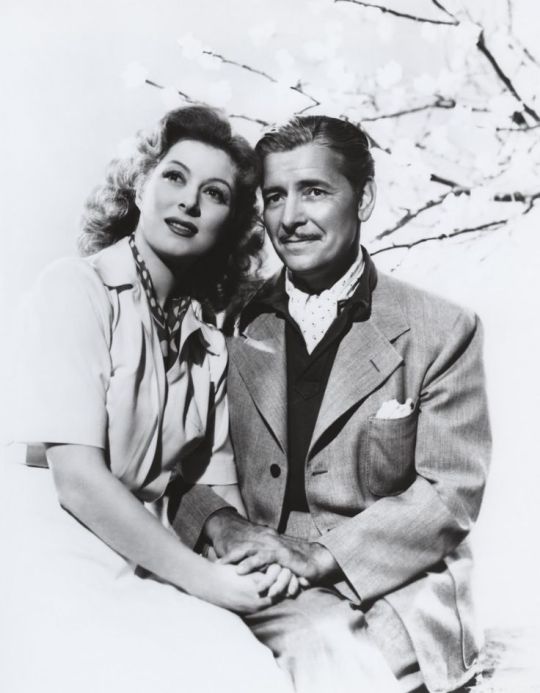

There was nothing about the dresses, suits, gowns, shoes and even the hairstyles that seemed to convey 1918-1919, the 1920s, or the early-to-mid 1930s.
But aside from these quibbles, I must be honest. I really enjoyed "RANDOM HARVEST". I have always enjoyed "RANDOM HARVEST". Between Mervyn LeRoy's direction and the screenplay written by Claudine West, George Froeschel and Arthur Wimperis; MGM released a movie that I believe proved to be one of the best romantic films I have ever seen. But the film's romance was enhanced by World War I's consequences upon Charles Ranier/John Smith's life and memories. "RANDOM HARVEST" not only struck me as a romantic film, but also a melancholic and sometimes, heartbreaking movie. Also, for a movie with a running time of 125 minutes, "RANDOM HARVEST" managed to maintain a steady pace, thanks to Mervyn LeRoy's direction. I found this mind boggling, considering I have found the pacing of many old movies from the 1930s and 1940s to be rather slow . . . almost to the point of dragging the movies to a stop. Thankfully, "RANDOM HARVEST" managed to convey a poignant and melancholy romance without putting me to sleep.
Certain aspects in the film's narrative managed rise "RANDOM HARVEST" above the usual tearjerker. The emotional impact of World War I upon Charles resulted in the creation of the melancholic and sad man struggling to deal with his amnesic state during the film's first half hour or so. Another scene featured Kitty Chilcet's - the stepdaughter of Charles' sister and his fiancee - discovery that he was not in love her. It proved to be one of the film's most haunting and emotionally devasting moments. One fabulous scene featured the revelation of Charles' secretary Margaret Hanson as Paula Ridgeway, the music hall entertainer he had married not long after the war. This revelation had led to a heartbreaking conversation between Margaret and Charles' former analyst and head of the Melridge asylum, Dr. Jonathan Benet, in which he advised her not to force her true identity upon Charles for the sake of his mental health. What made the film's second half even more poignant was Margaret's struggles to remain silent about hers and Charles' past, while stuck in what seemed like an arranged marriage between businessman and secretary.
"RANDOM HARVEST" managed to earn seven Academy Award nominations. Two of them were in the acting category - Best Actor for Ronald Colman and Best Supporting Actress for Susan Peters. For me, the two acting nominations served as a hint of the film's level of acting skills from the cast. There was not a performance that did not trouble me. The movie featured solid performances from Bramwell Fletcher, Rhys Williams, Melville Cooper, Jill Esmond, Alan Rapier, Ivan F. Simpson, Margaret Whycherly and Arthur Margetson. Una O'Connor and Reginald Owen both provided brief, yet entertaining performances as Melbridge citizens that Charles/"Smithy" had encountered on the night he had left the asylum. Henry Travers gave a poignant performance as doctor that the pair had befriended during their stay in Devon. Dutch actor Philip Dorn gave an intelligent, yet surprisingly emotional performance as Dr. Jonathan Benet, the gentle head doctor of the Melbridge asylum, who fell in love with Margaret/Paula years later.
Susan Peters reached the peak of her career in her portrayal of Kitty Chilcet, the step-daughter of Charles' sister. She gave an intelligent, yet lively performance as the charming, yet patient schoolgirl who managed to win Charles' heart. But in one scene in which Kitty realizes that Charles had memories of another love that would lead him to regard her as a stranger, Peters elevated her game and gave a subtle, yet skillful performance that led to an Oscar nomination for her. Of the three main leads, Greer Garson did not receive an acting nomination for her performance in "RANDOM HEART". Which seemed a pity to me, because I believe she really knocked it out of the ballpark as Margaret Hanson/"Paula Ridgeway", the music hall entertainer-turned-secretary who managed to win over Charles with her quiet wit, charm and warmth. Her rendition of the music hall song, "She's Ma Daisy", is something to behold. I believe Garson really shined in the film's second half, as her character struggled to nudge Charles into regaining his memories as "Smithy" and at the same time, keep her emotions and other identity in check during her "marriage of convenience" to him. In the end, Garson ended up being nominated for her performance in "MRS. MINIVER". She won in the end, but I cannot help wishing she had been nominated for her performance in "RANDOM HARVEST". For years, I have always pinpointed Ronald Colman as an actor known for his charm, dash and some pretty good acting skills. But in recent years, I have realized that I had underestimated just how skillful an actor he truly was. I thought he had given a phenomenon performance as a World War I amnesiac, who discovers he is a scion of a wealthy family. In scenes that featured "Smithy"'s confusion during the film's first thirty minutes, his confusion over his growing emotional dependence on Margaret and especially that one moment in which he regarded Kitty as a stranger, when his memories as Smithy returned briefly made me realize what a superb actor Colman truly was. It seemed a pity that he did not win the Best Actor award for that year.
It seems a miracle to me that Hollywood or anyone else has never considered making another serious adaptation of James Hilton's 1941 novel. Granted, that filmmaker or television producer would probably have great difficulty overcoming the ghost of the 1942 adaptation. I might as well say it . . . "RANDOM HARVEST" is excellent adaptation of Hilton's novel. Mervyn LeRoy did an excellent job in maintaining a strong pacing for such a melancholic story. Screenwriters Claudine West, George Froeschel and Arthur Wimperis had made some changes that proved to be very effective for the film's narrative. But without the excellent cast led by superb performances from Ronald Colman and Greer Garson, who knows if "RANDOM HARVEST" would have become the classic it now is.


#period drama#period dramas#old hollywood#james hilton#random harvest#random harvest 1942#mervyn leroy#ronald colman#greer garson#susan peters#bramwell fletcher#rhys williams#alan napier#melville cooper#mgm#jill esmond#ivan f. simpson#una o'connor#reginald owen#philip dorn#margaret whycherly#arthur margetson#world war i#amnesia#interwar period
0 notes
Text
Svengali
Svengali – the classic story of the obsessed hypnotist who compels a beautiful young woman to marry him …. But can’t compel her to fall in love with him.
(more…)

View On WordPress
1 note
·
View note
Text
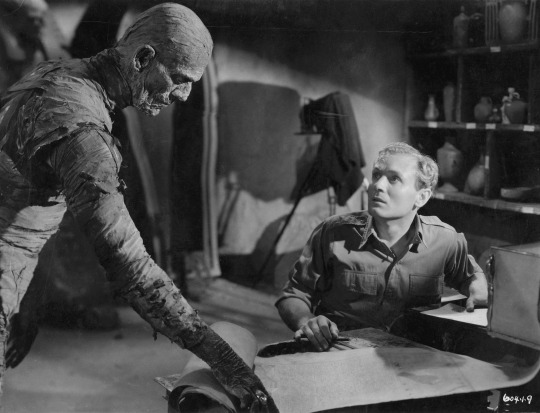
Boris Karloff and Bramwell Fletcher in The Mummy (1932)
#the mummy 1932#the mummy#boris karloff#universal monsters#universal horror#karl freund#1930s movies
79 notes
·
View notes
Text
Propelled chiefly by last year’s London production, I have written a (rather) long form piece to do with Rebecca the Musical. Though focusing mainly on this eventual and heavily expectant premiere of the English production of the musical, discussion relates also to the original and other iterations of the show, and musicals more generally, too.
The piece is anchored by the central theme of insatiability while looking in turn at:
the process of tracing the evasive histories of character representations and theatrical productions over many decades – including also flickered and largely forgotten records of the play and opera forms of Rebecca, and the “apparitional”, equivocal lens that queer female sexuality is handled with across large spans of time
decoding evidence of sparse, if periodically rather dire, female queerness in theatrical, musical contexts – guided by the disciples of dykeish dissatisfaction in the musical’s character of Mrs Danvers or the story’s primary author of Daphne du Maurier herself
considering what it means to exist as an audience member responding in situ to (principally female) performers with thrilling voices, both in and outside an auditorium, and the delicate but frequently under-discussed predicament of queer female diva devotion.
Take a look if you're interested!
In further expansion of photographic documentation of each of the examined stage-based, theatrical iterations of Rebecca, more images are presented below.
Discussion originates from the existence of the 2023 English premiere production of Rebecca the Musical at the Charing Cross Theatre in London, where cast principals included Kara Lane as Mrs Danvers (alternated by Melanie Bright), Lauren Jones as I (the new Mrs de Winter), and Richard Carson as Maxim. Photos by myself.



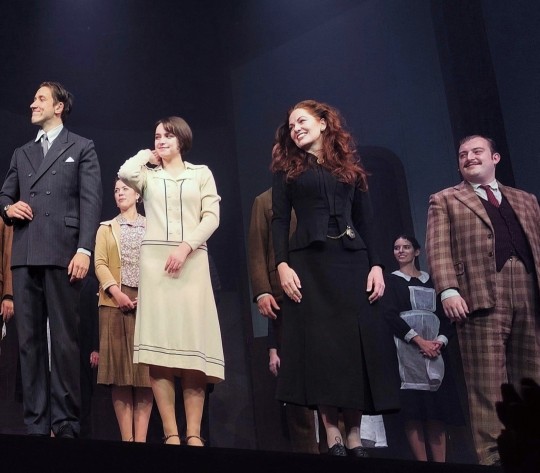
The first stage production of Rebecca arose much earlier, concerning the 1939 play by the same name at the Queen’s Theatre on Shaftesbury Avenue (now The Sondheim Theatre). Daphne du Maurier herself wrote its script. Margaret Rutherford played Mrs Danvers, Celia Johnson was the new Mrs de Winter, Owen Nares appeared as Maxim. The Queen’s Theatre was bombed in 1940 during WWII at the time of Rebecca’s occupancy, becoming the first theatre in London to be hit by a wartime bomb, and bringing to an immediate premature close the show’s successful run - and highlighting earlier associations of this story's connection to tumultuous tales and dramatic events in histories of it's staging, as the attempted primary stagings of the English musical iteration would later return to.
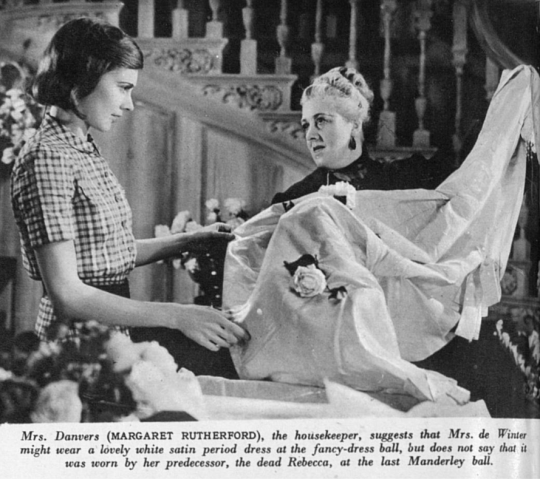



Photos from this first theatrical, London production include those by Angus McBean from a periodical spread entitled ‘Mystery and Murder in Stately Cornish Home - Dramatic Moments of Du Maurier’s “Rebecca.”’, published in The Sketch (vol. 190), May 1940.


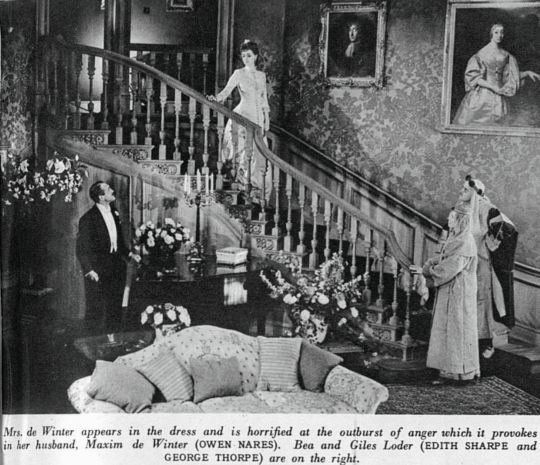

The play also then appeared on the road in America, and subsequently on Broadway in 1945 at the Ethel Barrymore Theatre for a fleeting 20 performances; and of this entity, record remains even more scarce. Cast principals included: Florence Reed (Mrs Danvers), Diana Barrymore (the new Mrs de Winter), Bramwell Fletcher (Maxim).
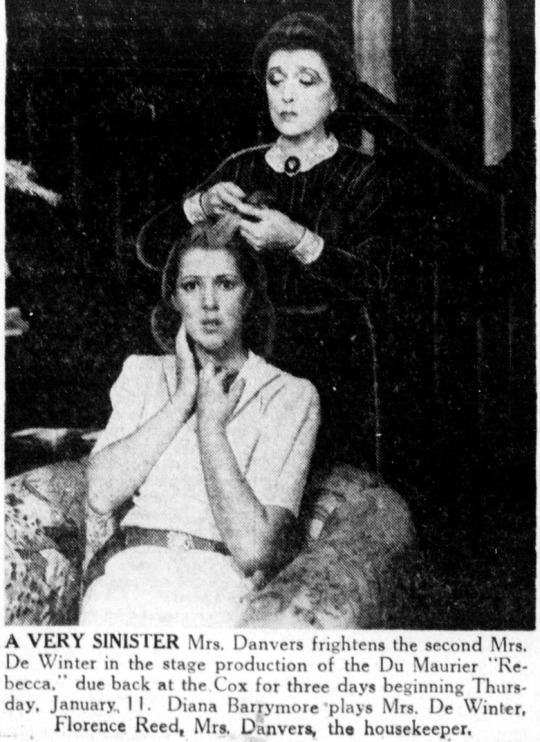
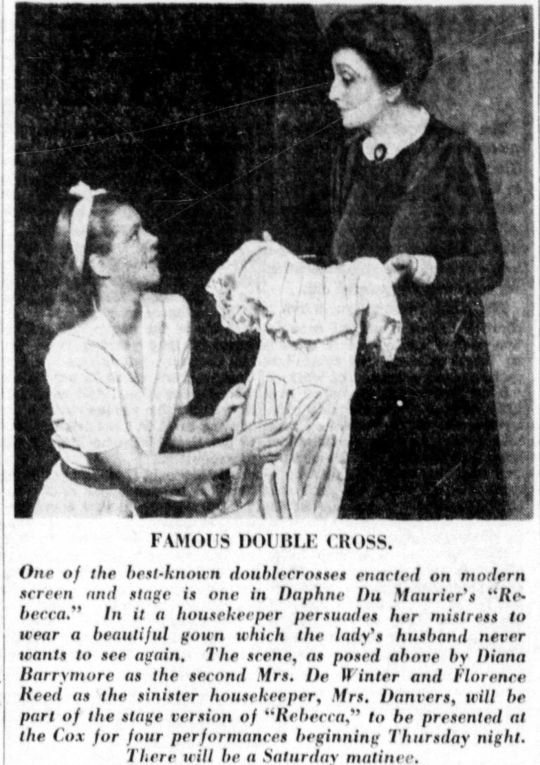


The next and last distinct adaptation of Rebecca to appear on stage before the musical was the 1983 opera production devised for Opera North, with music by Wilfred Josephs and libretto by Edward Marsh. It toured the UK before being revived briefly in 1988 and never seen again. Cast principals included: Ann Howard as Mrs Danvers, with Gillian Sullivan and later Anne Williams-King as the new Mrs de Winter, and Peter Knapp as Maxim.
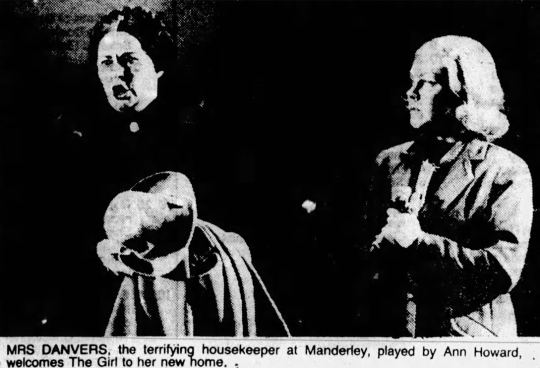
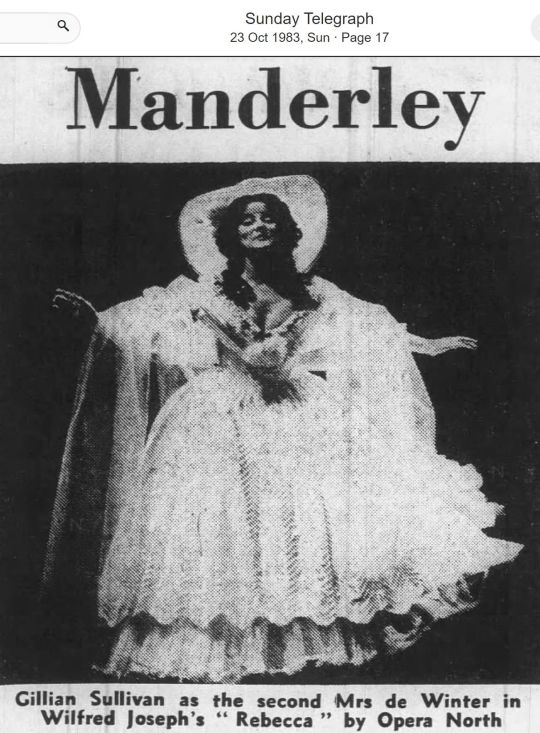
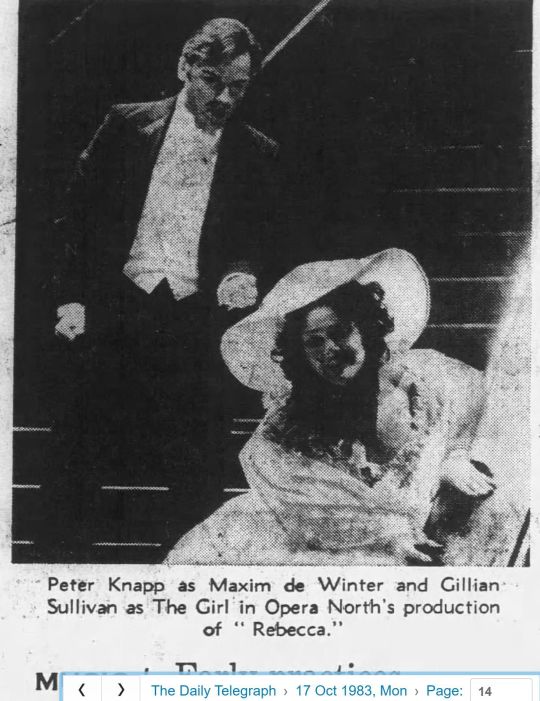
Finding these few, historic photographs in obscure newspapers or consulting original scripts and librettos, for instance, in libraries and archives during this effortful and active treasure-hunting felt special and rewarding. But possible reconstruction of these stage iterations in the present day is only incompletely possible, because of reduced ease of access to or apparent remaining visceral evidence of a visceral art form.
The frustration in trying to seek out these apparitional traces not only foregrounds the importance of maintaining accessible, comprehensive primary records within the theatre, but mirrors also the act of trying to seek out records of queer female sexuality across history in works of literature, cinema or theatre, as a process typified by a similarly effortful navigation of apparitional erasure. This facet connects with the notion that consideration around Rebecca entangles with a web of insatiability or dykeish dissatisfaction, a web that stretches from this erasure and liminality of representation, to character constructions within the work – including of its infamous housekeeper, Mrs Danvers, to contextual backgrounds like those of the story’s primary author itself, Daphne du Maurier.
The entity of Rebecca, then, across its many themes, productions and decades, is uniquely useful in the way it can in turn encompass and facilitate explorations of these many facets – being capable of simultaneously holding consideration of these expansive webs of documentation, erasure or dykeish dissatisfaction that can be found lurking in historical margins, as well as also the contrasting luminous energy that can be produced in the present in association with the musical, as physical audiences interact with and respond to the material of the show and its performers within theatres in real time. These considerations have transferrable applicability beyond this singular context of this particular show to more general notions of theatrical pieces and the practice of theatregoing, too, as they foreground the question of how audience members respond to, process, and interact with shows; and, as a matter of far less common discussion or scholarly writing on the subject of diva devotion, how female fans specifically navigate the complex predicament of queer, female, performance-driven high regard.
#rebecca the musical#rebecca das musical#rebecca#mrs danvers#ich#the new mrs de winter#daphne du maurier#lonbecca#rebecca london#kara lane#willemijn verkaik#musical theatre#musicals#terry castle#wayne koestenbaum#the apparitional lesbian#theatre
18 notes
·
View notes
Text

Boris Karloff and Bramwell Fletcher in "The Mummy".
9 notes
·
View notes
Note
17 for the Horror Movie Asks?
Thanks! <3
17) a decade you have seen the most horror movies from
1930s!! Obsessed with Boris Karloff since I was a teen, as well as Colin Clive, but generally, that decade is great for horror because more is imagined than seen but also what you see evokes huge emotions and genuine fear. Bramwell Fletcher laughing, literally going mad in The Mummy 1932, Karloff about to be literally skinned alive in The Black Cat as well as a scene where he as a ROOM full of embalmed wives floating in glass cases. I could go on, but this period of horror films was heavily inspired by post-WWI horrors, xenophobia, racism, and antisemitism, resulting in some of the most thought provoking films that transcend the genre.
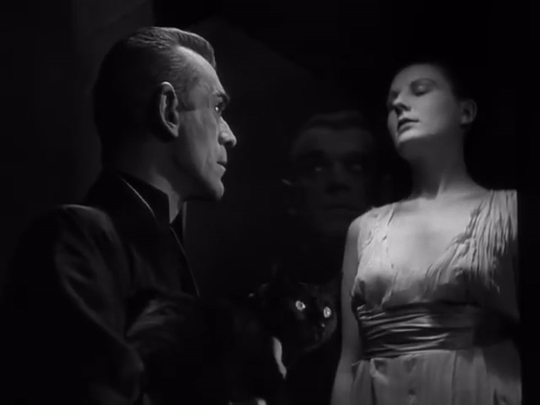
ask me
4 notes
·
View notes
Photo
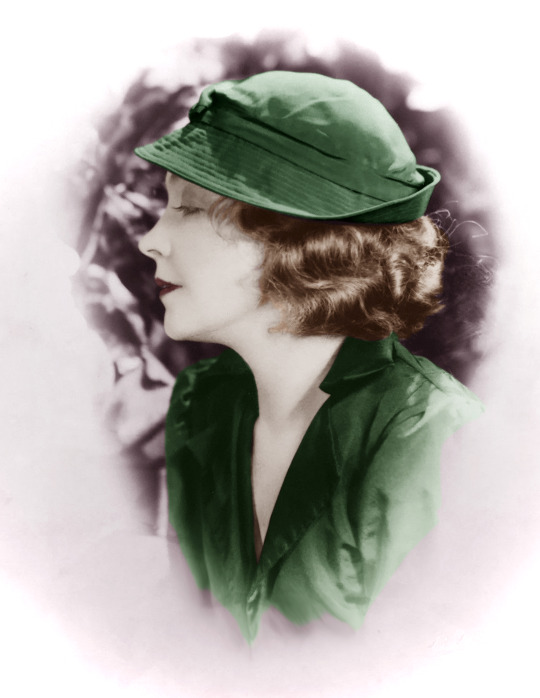
The National had a series of failures and quick bookings during 1932 and 1933 and was dark for more than a year during those gray Depression days. But on October 22, 1934, a distinguished drama opened at this theatre. It was Sean O'Casey's Within the Gates, directed by Melvyn Douglas and starring Lillian Gish as a prostitute, Bramwell Fletcher as a poet, and Moffat Johnston as a bishop. The play took place in London's Hyde Park, and the very large cast represented the great variety of humanity who spent their days in the park. There was music, dancing, and philosophizing, and Brooks Atkinson in The Times pronounced: "Nothing so grand has risen in our impoverished theatre since this reporter first began writing of plays."
3 notes
·
View notes
Text
Unbidden - Epilogue 14
Masterlist | Previous | Next
Content warnings: low self worth, chronic pain, some internalized ableism but it's mainly tied up in the general self-loathing, bloody nose.
"So what do you need the thistles for, again?" she asked.
Overcast days were some of Morgan's favourites. When the clouds didn't bring the heaviness of a storm with them, but were still substantial enough to block the most piercing of the sun's rays. The temperature was right, the lighting was right, and with Blaise keeping him company as he harvested some nettles, it felt like pretty much everything else was right too.
"They aren't thistles," Morgan explained, reaching for another one with his left hand. He'd instructed the magically enhanced skin to be thicker, and not to convey any sensation until he was finished harvesting. "They're nettles."
"Huh," Blaise said. "I thought those were the same thing. What's the difference?"
Morgan glanced at her briefly. She was sitting comfortably on the low stone wall at the border of his property, aiming a small, expectant smile in his direction. She wouldn't have asked for an explanation if she didn't want one, probably.
"They have different strengths. Thistle is more effective for appetite and digestion, and it's an ingredient in some types of antivenin and other curatives. Nettle is more effective against inflammation, like muscle pain and seasonal allergy. That's why I'm gathering these. I can use some in a salve for Pansy to use on her shoulder, and I can save some for the fletcher's family. It's likely the children suffer the same allergies as the father." It was gratifying, being able to apply his knowledge to actually help people. His familiarity with Bramwell's inhabitants was growing steadily.
"Sounds convenient," Blaise said, tapping her heel lightly against the wall. "How can you tell the difference between the plants, though?"
"Their leaves are different shapes," Morgan replied. "Thistles have leaves that are more oblong, where nettles are more tapered. And thistles have sturdier spines. With nettles, it looks almost like hairs on their stems and leaves. Those thin spines break off in your skin and that's what gives the nettle its sting."
Blaise made a quiet sound to acknowledge his explanation. He'd successfully sated her curiosity, then. A pleased warmth glowed at his core as he continued to harvest in a comfortable shared silence.
"I've been thinking," Blaise said after several quiet minutes. That was not something she said regularly. She was always thinking, of course, she had a busy and clever mind, but she rarely announced it. It usually meant she'd reached some sort of significant decision.
Dread snuffed the warmth of Morgan's contentment, oozing up from the space between his stomach and his lungs. It reached cold, sticky fingers around both and began to twist. He had been too happy, for too long, hadn't he? Something had to change. It was overdue.
"What about?" he asked, when it became clear that she was waiting on a response.
"Thinking I'm going to head back out on the road for a while."
The cold inside Morgan lurched and swelled. It curled around his heart and leaked into his veins until every inch of him was filled with ice. The shell of his body mercifully turned away, continuing to harvest nettles mechanically.
Of course Blaise was leaving. This was bound to happen eventually. It was her nature. Brave, adventurous, insatiable in her desire for new experiences. She needed novelty like a fire needed fuel. It was essential to her as much as eating or drinking. To limit her would be a disservice, a cruelty.
And that was what he had been doing, here. By accepting the post as town herbalist, settling down, getting comfortable over these quiet weeks. Keeping her trapped. She must have felt obligated to keep him company because of their friendship. But friendship was supposed to be reciprocal, and he hadn't been holding up his end. Like a bindweed twining itself around a hardier plant, as he spread out his roots here he was depriving her of what she needed. Choking her.
Of course she needed to leave. And of course she had been too kind to say anything until now. It must have finally gotten unbearable, slowly wasting away in this unremarkable town with so little to occupy her. She had always needed much more than she could ever hope to find in a single place. Morgan had simply grown complacent, allowed himself to forget that simple fact in the face of his own contentment. Allowed his selfish wants to overshadow her needs.
All this realization flooded in at once, in the space of time it took for him to uproot another nettle. Only a few seconds. Time continued to drag on as he reached toward the next plant. He couldn't just be silent. Blaise would certainly sense his turmoil, and then what? Would she force herself into more torturous stillness on his behalf? Would she go anyway, as she needed to, but with an added weight on her conscience? No, neither of those would be acceptable.
A third possibility occurred to him. Unlikely, nigh impossible. But he had to say something. He reached down inside himself to haul up his old defenses, the neutral mask behind which he'd always cached his emotions.
"Do you want me to come with you?"
Morgan knew the answer before the words had formed on his lips, tasting of sand. She had said 'I', not 'we'. He asked anyway. It was always best to be certain about things. Better to know the truth than to allow the flame of foolish hope to go unsnuffed. That flame could never illuminate, only burn.
"You're all settled here. You've got people relying on you now, I wouldn't take you away from them. And it seems like… like it's been easier for you here. Not having to walk so much, you know," Blaise said.
That wasn't a direct refusal but it was undeniable nonetheless. The deflection meant she wanted him to stay here while she left. And why not? It wasn't as though he was any use to her in her travels. She was more than capable of looking after herself. It would undoubtedly be even easier for her without his weight to drag along. Without having to slow her pace to ease his pains, without having to cater to his many unusual sensitivities. She certainly didn't need what little help he was capable of offering.
And of course he knew it. Of course he had known all along, hadn't he, deep down? That he was nothing more than a burden to her. An inconvenience at best, carried by her great strength and the kindness of her heart. He had stupidly allowed himself to believe otherwise, to entertain a nonsensical fantasy of equality. Her overwhelming kindness had dazzled him, temporarily blinded him to the truth.
But objectively, as he had once known how to evaluate things, that truth persisted unchanged. Her strength, his weakness. Her goodness, his greed. Of course he wanted her to stay. Like a tick grown fat off the blood of a stronger creature, he was taking and taking at her expense. He could be perfectly contented for the rest of his life if it could go on forever just as it had been for the past weeks. But Blaise would wither without change and challenge and excitement in her life, and to deprive her of those things would be the worst possible disservice he could do her.
"Very well," Morgan said. His voice did not tremble, for which he was briefly grateful. "When do you think you'll depart?"
Tell me 'never'. Tell me this is just a joke I don't understand. Tell me you aren't going to leave me behind. Tell me how to be enough to make you want to stay with me. I can try harder, I can go faster, I can learn, I can do more, I can be better. I could do anything for you, I just need to know what it is. I need more time.
More time she could not stand. Even if he was capable of matching her in any way, stillness would never be in her nature. It would be cruel to ask of her. It was cruel to even want.
"Pretty soon, actually," Blaise said. "That's why I came early for breakfast today. I always wake up earlier when I know I'm going on a trip."
Oh. Today. Soon. This was it, then. Morgan had unknowingly squandered his time, letting precious days slide past with no thought for the future. Stupidly, selfishly imagining that his idyllic situation might actually be something he could keep. And now it was slipping away and he couldn't think of what to do except continue to watch himself uprooting nettles, as if he was merely a passenger inside his own body.
He wanted desperately for Blaise to stay with him. He also wanted Blaise to flourish. The two states could not coexist. She deserved to pursue her happiness much more than he deserved to be by her side. He had to let her go. An ugly part of him didn't want to. But staying here would smother her; he couldn't bring himself to harm her like that.
He couldn't bring himself to respond, either. A bird trilled nearby.
"I'm gonna miss you, you know," Blaise said.
Then why are you–
Morgan crushed the thought. The answer was obvious anyway. He forced himself to stand, bracing a hand on his knee as it protested the change. Then he forced himself to turn toward Blaise, trying to school his features into an appropriate expression. Corners of the mouth lifted, cheeks tightened slightly, eyes squinted a little to emulate the way hers always got when she smiled.
"I suppose I'll be right here," he said. "You'll always be welcome if you want to visit."
"Of course I'll come back to visit." Blaise favoured him with one of her slightly lopsided smiles. "I live here now, remember? Just like you. This is my home now. I might be travelling for a while, but I'll always come home."
Right. She held property here, too, had taken one of the vacant hunters' cottages as payment for a contract. Her family lived in nearby Westmarch. She would come back eventually. Or at least, she would intend to. If nothing happened to her. This town was as much her home as anywhere. Not as much her home as his, though, Morgan supposed. He had settled in, accepted this house and garden and begun offering a service to people. It had started to feel like a home. The first he'd had since his expulsion from the Order. The first he could ever really call his own.
He would trade it in a heartbeat, he thought nonsensically. The business, the house, the garden. He would give them up in an instant if it meant he could stay with Blaise. If he could just shrug off his awful, painful, misbegotten body and press the essence of his spirit into the spaces between her ribs, nestle in close to her heart. If he could be easy, effortless to carry with her wherever she needed to roam. If she could be his home. The pang of longing was as sharp as it was impossible, and he nearly choked on it.
Blaise's smile fell a little, a crease forming between her eyebrows. She was scrutinizing his expression, Morgan realized. It was probably beginning to get away from him. He couldn't afford to let it slip, couldn't bear to make himself any more of an obstacle to her happiness than he'd already been.
Morgan bent to pick up the basket of nettles. The ones he'd stacked more recently were sitting askew at the top of the pile. It still felt like he was watching himself from a distance as he used his right hand to straighten them.
The distance disappeared as dozens of tiny spines pierced his skin, spreading a prickling fire across the palm of his hand. He yelped and drew his hand back, resisting the urge to clench it into a fist. Instead he wiped it carefully on a corner of his shirt to dislodge as many of the spines as possible.
"Ow. Hey, are you all right?"
Morgan almost smiled at that. It wasn't the first time he'd seen her witness a minor injury and respond as though she shared the pain. Just one of the many ways her kindness shone out of her. But there was no sense in her wasting her sympathy on him.
"It's fine," Morgan said, giving his hand a loose shake. That pain was the one Blaise was asking about, and it was minuscule in the grand scheme of things. The last thing she needed was to worry about him.
"All right, well… I guess I'm going to head out," Blaise said. "Portal out to Westmarch, maybe grab something to eat with Fennan before I catch a caravan."
Morgan swallowed down all the pointless, selfish protests fighting to escape from between his teeth.
"Farewell, then," he said instead. Please fare well. Please find happiness. Please be safe. Please come back. Please don't go.
Blaise spread her arms for a hug. Morgan dropped his basket of nettles with perhaps a little less care than they deserved. It didn't matter. He could pick them up later. But this would be the last opportunity he had to share an embrace with Blaise for some time – maybe forever, if things went poorly – so he flung his arms around her middle and tried not to squeeze too tightly.
She smelled of clean linen and oiled leather. Morgan tipped his chin up a little to catch her underlying scent, the one that clung to her skin and hair and reminded him a little of sun-warmed ironwood. Subtle and earthy and comforting, uniquely hers. He filled his lungs with it again and again as if by some miracle he could save a hint of her inside himself.
After altogether too short a time Blaise loosened her hold, and Morgan reluctantly followed suit. Her hands lingered briefly on his shoulders before she took a step back, looking him over. He made his face do the smile again, hoping to satisfy whatever it was she was looking for. It seemed to do the trick.
"Well, take care," Blaise said.
"You as well," Morgan replied.
Blaise lifted one hand in a small wave, then hopped over the low garden wall and started walking. Morgan stood rooted to the spot. It took all his willpower to keep from calling out to her. He couldn't. He wouldn't. She would come back, he reminded himself. She would intend to come back. If no ill befell her. If she didn't find something better. He would have been hoping for her to find something better, if he wasn't so selfish. She deserved to be free of him.
He watched her until her details faded into a blur, then he reached out with his mind to get a clearer sense of her form. She slowed at the bend in the road. Treacherous hope leapt into Morgan's mind as she turned around. But she just raised her hand to wave at him again, and kept going. He raised his own hand in response. The rest of him was frozen.
He watched her as long as he could, extending his awareness as far as it could possibly stretch. She passed its limit all at once. Suddenly there was nothing where she had been, and no matter how desperately he reached, he couldn't find her again.
Morgan was alone in the world.
He felt suddenly, acutely small, a speck in the middle of a vast emptiness. But how else could it ever have been? He was small. Insignificant. Useless. It had been folly to imagine he'd somehow belonged together with someone as exceptional as Blaise. Just because it had been wonderful, that didn't mean it was something he could really have. He wasn't worth it. He understood that. He accepted it. No point in refusing to acknowledge the truth.
Understanding and acceptance did very little to ease the pain of finding himself unwanted once more.
His Order hadn't wanted him. Sent him away to die. Blaise hadn't wanted him either, not really. Walked away on her own, left him here. Nobody could blame them. Nothing about him had ever been worth keeping, had it? Morgan lay down by the patch of nettles and retreated into meditation. It was the closest he could get to leaving himself behind, too.
***
The quarter moon shone its pale light down on Morgan's motionless form. He stared up toward it, eyes not really focusing on the bright half circle. His attention floated like a spiderweb on the breeze, just barely tethered to him. The floating was numb and almost pleasant and ultimately just a diversion. It could never accomplish anything. And besides, it would be terribly irresponsible of him to let his body waste away to nothing down there. He reeled himself back in reluctantly.
Morgan raised his right hand – trembling, he noted with distant disdain, weak, still faintly aching from the nettle's sting – and placed it on his chest. Linen over uneven flesh over bone over lungs over heart. Physically sound, as whole as it would ever be. The wound he needed to close was on a different plane.
He mended slowly, using what he could grasp.
He was living. One stitch.
As long as he was living, he could act. One stitch.
As long as he could act, he could be useful. No, not quite a stitch. The edges of it weren't stable enough.
He could learn. He could better learn the needs of the people here, learn how to meet them, make himself useful to them. Utility did not come easily to him, but surely with a concerted effort he could produce something of some value to someone.
There it was, enough to stitch together. Enough to hold.
He could carve himself a place here. Just on the outskirts of town, just on the outskirts of the people's lives. Near enough to make himself useful. Far enough to stay aware of the trap, to keep himself from stepping into it again.
The trap of thinking that something like him could ever deserve to really belong anywhere, with anyone.
Certainly it was a pleasant enough fantasy to entertain. But he was so foolish he would inevitably begin to actually believe it, and then it was too painful to be reminded of the reality. He couldn't bear to go through this again. He wasn't strong enough.
But he had the truth of it firmly in his grasp now. Knowing the truth was objectively better than believing a falsehood, no matter how comfortable.
The earth Morgan was resting on, in contrast, was not very comfortable at all. It had gotten cold. The ground sucked away his body heat and left him shivering, an aching chill settled deep in his joints. The aches grew distinctly sharper as he struggled up into a seated position. They flared like oil thrown into a fire, burning but somehow without enough warmth to combat the cold that had burrowed through his bones. He clenched his jaw against a pained groan. There was no point complaining about the discomfort he'd brought upon himself.
Morgan paused for a moment to gather himself and consider his options. It had not been an excellent decision, lying still here as the hours trickled past. It meant he'd never started the hearth-fire, which meant he couldn't have a golem brew him any tea to warm and fortify him. Trying to direct one to start a fire on its own would require more energy and precision than he had at his disposal. That left only the option of getting himself inside the house.
He heaved forward and got his right foot under him, bracing his hands on the ground. It tilted a little, as though he was on a ship's deck. Getting all the way inside was going to be a challenge. Two deep breaths and the dizzying motion subsided.
Morgan's body echoed with a din of protest as he dragged himself to his feet. He gritted his teeth against the tight pull in his disused muscles, the pinch of scar tissue trying to stretch, the stabbing pain of stiff joints forced into motion. It didn't matter. None of his pain mattered. He'd earned it, anyway, through his own actions. He deserved each twinge, each spasm, each starburst behind his eyes.
But deserve it though he may, that didn't mean he could handle it. His body was too frail, the pain too great for it to bear with any grace. After only a few steps his knees buckled without his permission and sent him sprawling face down in the dirt.
Something snapped as Morgan hit the ground, and not just the cartilage of his nose. He hardly felt the fracture, overshadowed as it was by the fury coursing suddenly through him. Boiling, seething, glowing hot with its ferocity. Damn this pain. Damn this weakness. Damn this body. Damn his whole self! Damn everything he'd ever touched, as though it hadn't already been damned by the misfortune of touching him!
The sound that poured out of his throat was thin and pathetic, more the timbre of a whine than a roar. It shattered his fury and the glittering pieces fell like ash, settling over him as shame instead.
That, at least, was familiar.
It didn't matter if his pride was bruised. His fault, anyway, for being fool enough to have any in the first place. He'd picked up delusions of grandeur on his travels, grown so accustomed to Blaise's importance that he'd forgotten his own place in things. Set himself up to fail. He'd known, once, just how insignificant he was. It was time he remembered. Past time, really. He just needed to get inside so he could reflect on it properly.
Morgan pushed out with his will. The ground responded, lifting up beneath him. It resolved into a vaguely quadrupedal shape, making a passenger of him as it shambled toward the house. Not especially comfortable, but his comfort was not important. At least his magic was more reliable than his body.
The golem squeezed through the doorway and deposited Morgan into a chair. He watched it with a dull detachment as it shifted into a smaller form with more defined hands. It moved over to the hearth, rearranging the kindling until he was satisfied with its structure. At least this was possible now that he could see what was happening. It struck the flint several times before it produced a spark, but once it achieved the correct angle it soon had a little flame crackling away.
Good. Now Morgan could heat something up, put some food into his body. Ensure the town wouldn't have to lose their second herbalist within a year. He might not be important, but the position was. He scrubbed his face with his sleeve, wiping at the blood still trickling sluggishly from his nose. As long as he took a little care of himself, nobody would have to clean up his mess. And he would still be here when Blaise… if Blaise… no, that whole area was altogether too tender, too raw. He yanked his mind away from it.
He could fuel his body and organize his stock and plan his growing and harvesting and distilling and desiccation and all the other preparations that would need attention. He could busy himself with the immense task of becoming useful. Yes, that was a suitable purpose to work toward. Impossibly large, perhaps, but at least that was familiar too. He'd spent a long time working toward a goal much too large for a single person to ever accomplish. He knew that path, could tread it. Yes. He could do this.
Even alone, he could do this.
#my writing#story: unbidden#chronic pain tw#blood tw#but just a mention really#ableism tw#unhappy little man tw :)#oh yeah maybe i tag this one#emotional whump
8 notes
·
View notes
Photo

#daughter of the dragon#anna may wong#warner oland#sessue hayakawa#bramwell fletcher#lloyd corrigan#1931
1 note
·
View note
Photo

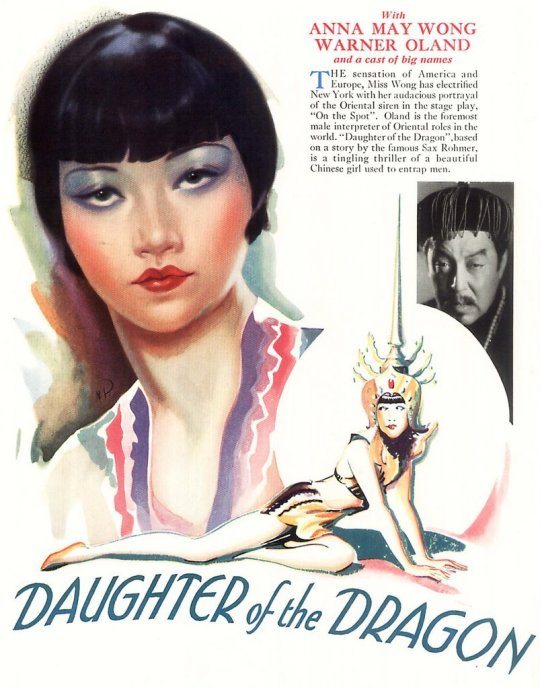

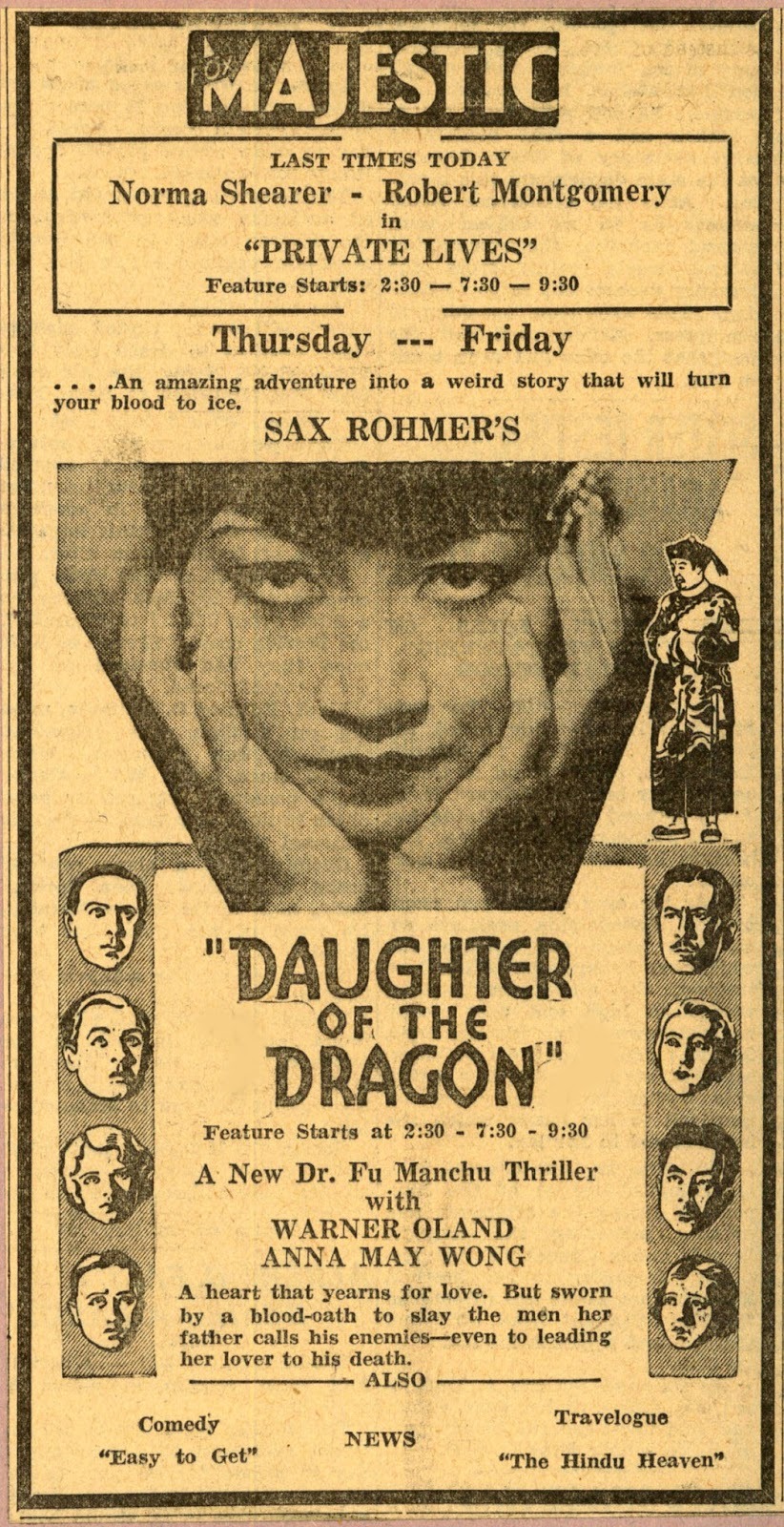
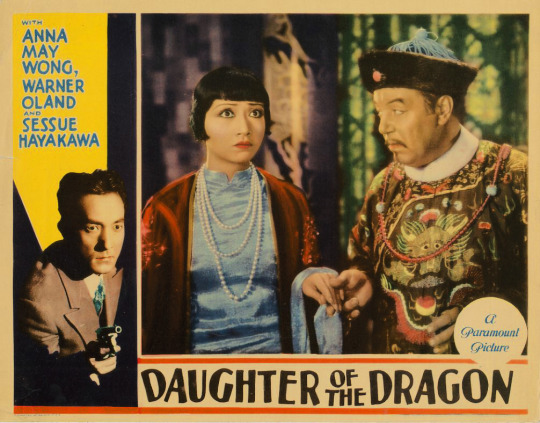



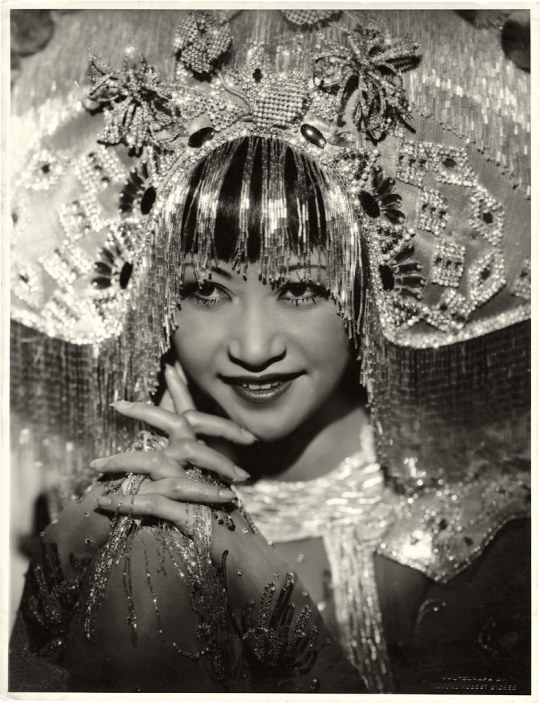

Daughter of the Dragon (1931) Lloyd Corrigan
July 27th 2022
#daughter of the dragon#1931#lloyd corrigan#anna may wong#sessue hayakawa#bramwell fletcher#e. alyn warren#warner oland#harold minjir#nicholas soussanin#frances dade#lawrence grant#nella walker#holmes herbert#pre-code
5 notes
·
View notes
Text
Having seen the 1939 Raffles film first makes one inclined to like the 1930 version better. It's the same plot (the 1939 film being a remake of this one), but the 1930 film has two major advantages:
More Bunny. Still not enough Bunny and he still isn't involved in any actual crime, but he is at least present throughout the film and he and Raffles clearly have a relationship. He gets to do the "Hello, Raffles, I am going to be disgraced and so I have decided to dramatically commit suicide in your apartment" bit from "Ides of March" and later gets to tackle a man in his pajamas. Also, he's played by Bramwell Fletcher, who has the right 'pathetic rabbit' energy.
As the above suicide attempt indicates, this film is firmly pre-Code. Which means that, unlike the 1939 version, Raffles gets away at the end. No one wants to watch a movie about a gentleman thief that ends with him getting arrested.
It's still not a good adaptation - it's far too straight for that - but it's certainly better.
#i mean#if raffles is going to have a love interest it ought to be bunny#but if you must invent a lady#at least let her also rob jewelry stores#raffles
1 note
·
View note